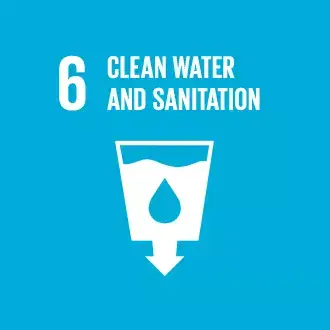

Faith Communities Provide Water, Sanitation and Hygiene (WASH)
Water is life. It nourishes the earth, washes away disease, and flows through the heart of every sustainable development goal. Yet our most precious resource is at risk.
More than 2 billion people lack safe drinking water. More than 4 billion lack safely managed sanitation services. More than a third of households and health care providers lack basic handwashing facilities. The UN estimates that water scarcity could displace 700 million people by 2030.
Poor access to water and sanitation brings dire consequences for socio-economic development, peace and security, human survival, and our natural world.
Goal 6 aims to achieve universal equitable access to safe and affordable drinking water and adequate sanitation and hygiene by 2030. To succeed, UN bodies and partners are working with local communities and industries to end open defecation, reduce pollution, eliminate dumping, minimise the release of hazardous chemicals and untreated wastewater, increase water recycling and safe reuse, and protect and restore water-related ecosystems. These targets seek to improve water quality and reduce scarcity for all.
Water is sacred in most religions, and countless faith communities are working hard to improve water justice around the world.
The Global Interfaith Water, Sanitation & Hygiene (WASH) Alliance (GIWA), based in Rishikesh, India, collaborates with spiritual leaders and civil society to improve WASH standards, provide disaster relief services, and promote river conservation and environmental preservation.
“Religious leaders play a critical role in addressing seemingly intractable problems like access to safe water and sanitation. These things affect us all, so it’s no surprise that interfaith dialogue and harmony have flowed from this work,” said Nandini Tripathi, GIWA’s Director of Programme Implementation, Integration, and Communication.
When India’s government made millions of sanitary toilets available in its Open Defecation Free (ODF) campaign a few years ago, not enough people were using them. GIWA worked with faith leaders to spread the message that “just like temples keep our thoughts clean, toilets keep our bodies clean”. By speaking about these issues in religious terms, GIWA’s partners helped inspire local communities to end open defecation.
GIWA also leads educational programmes to inspire young people of different faiths to be ambassadors for water conservation and women empowerment programmes to promote healthy menstrual hygiene management. With droughts and floods crippling major cities and threatening much of India’s population, GIWA works with partners to rejuvenate rivers and reframe waste as wealth to promote sustainable development.
Another faith-based coalition that’s active in the water justice community is the International Partnership on Religion and Sustainable Development (PaRD). With more than 100 member organizations around the world, PaRD fosters collaboration to support clean water and sanitation, climate action, life below water, and life on land. PaRD members, many of which are faith-inspired and religious organizations, champion faith-based approaches that complement and add unique value to secular work on sustainable development. This value is most evident when religious institutions and FBOs leverage their tight-knit global networks to reach some of the world’s remotest communities.
Their power for good was on full display during World Water Week in August 2019 when PaRD members came together in Stockholm for a Water and Faith Showcase and Network Meeting aimed at increasing collaboration across diverse communities and mobilising local faith actors to achieve SDG #6.
The event highlighted scalable faith-based WASH development models in Zimbabwe and Zambia along with a new toolkit called Flourish that the Christian NGOs Living Water International and Tearfund UK developed to help churches and communities work together on WASH mobilisation. Delegates also learned about Faith and Water in Malawi, which trains local religious leaders and community members to use simple pumps, rainwater harvesting, and water filters made of local materials. Faith and Water’s collaboration with religious and traditional leaders, who are trusted pillars capable of inspiring behavioural change in many communities, helps to ensure the long-term sustainability of this vital work.
One notable PaRD member, the World Council of Churches’ Ecumenical Water Network (EWN), started in 2006 as a platform for hundreds of Christian churches and organizations to promote the preservation, responsible management, and equitable distribution of water for all. The network is motivated by the belief that water is a gift from God and a fundamental human right. EWN’s key programmes include a WASH curriculum for students at thousands of WCC-affiliated schools and “Seven Weeks for Water”, an annual campaign that offers theological reflections and other resources on water justice during the Lenten period.
Another PaRD member organization advancing Goal 6 is Faith in Water, which works with religious communities and secular organizations primarily in Africa and Asia to improve WASH standards for some of the world's poorest people. Faith in Water inspires religious groups to focus on WASH in their teachings and traditions and helps secular organizations understand the inherent value of this faith-based approach, building closer relationships to benefit people, nature, and the planet.
The networks that organizations like GIWA and PaRD facilitate and the interreligious work their members implement show the incredible impact faith-based approaches can bring to water justice and other sustainable development movements. As the secular WASH community increasingly recognises the benefits of partnering with religious actors, faith groups are publicly supporting WASH and spreading action-oriented messages to their religious communities with greater conviction than ever before. This cross-sector collaboration is vital to achieving Goal 6 and protecting water -- our most sacred resource -- now and for the future.